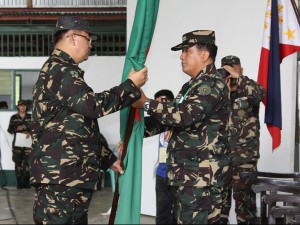
Brigadier General Aurelio B Baladad (left) receiving the command symbol of 3rd Infantry Division, Philippine Army from Lt. Gen. Noel A Coballes (right), Army Commanding General, in turnover rites on Tuesday in Camp Gen Macario Peralta in Capiz. CONTRIBUTED PHOTO
MANILA, Philippines – Brigadier General Aurelio Baladad, one of the officers charged with alleged torture and illegal arrest of supposed health workers popularly known as the “Morong 43,” vowed to use “pressure” on communist rebels to end their decades-long armed struggle.
“We will apply pressure on them so that they will renounce violence [and] will be forced to go back to the mainstream of society,” the newly installed commander of the Army’s 3rd Infantry Division told INQUIRER.net in a phone interview Wednesday.
Baladad assumed his new post at Camp Peralta in Capiz on Tuesday, replacing Major General Jose Mabanta who retired last month. As commander of 3ID, he will be in charge of internal security operations in Western Visayas. He was previously the deputy chief of staff for Operations at Camp Aguinaldo (J3).
Brigadier General Rodelio Santos, former chief of Joint Peace Security Coordinating Councils, replaced Baladad as deputy chief of staff for Operations.
Baladad said that there are more rebels returning to the government fold to avail themselves of the peace package.
“Why not renounce the armed violence… there are other ways to solve problems and it’s not through violence,” he said.
The Army general, a member of the Philippine Military Academy Class of 1982, was then a colonel when he headed the Army’s 202nd Brigade which captured suspected communist rebels in Morong town in Rizal. The captured persons, who claimed they were health workers, were later known as Morong 43.
Government security forces said they recovered subversive documents and firearms and accused the supposed health workers of assembling explosive devices during the raid on a residential compound in Morong.
Five of the health workers later admitted they were NPA members. They were convinced to obtain the government’s amnesty program. Last year, six of the Morong 43 reportedly rejoined their armed comrades. The rest were released after the government withdrew the charges against them.
“Five of them said there was no torture. Bakit konti lang sa kanila ang nagreklamo. Nasaan yung iba, nasa bundok na ulit sila (Why only a few were complaining. Where are the rest, back in the mountains?)” he said.
Baladad also said he is aiming to transform Western Visayas into “more peaceful and development-ready [region],” especially in Negros Oriental.
“Tama na ang barilan (enough of fighting). Let’s talk so we can have a more peaceful society,” he urged the rebels, emphasizing that achieving peace is not purely a military solution.
“Mga kapatid din natin yan, at ang sagot ay hindi armed struggle (They (rebels) are also our brothers, and the answer is not armed struggle),” he added.
“The key here is there should be a peaceful atmosphere for development to foster. [In the absence of a secure environment], there is not much development…,” he said.
With still about 418 communist rebels entrenched in Western Visayas, Baladad said they are looking to make them insignificant by 2016, the same timeframe that the military is targeting to defeat communist rebels.
At present, the Armed Forces of the Philippines is facing the challenge of making about 4,000 rebels irrelevant by 2016 through its anti-insurgency strategy Internal Peace Security Plan Bayanihan.